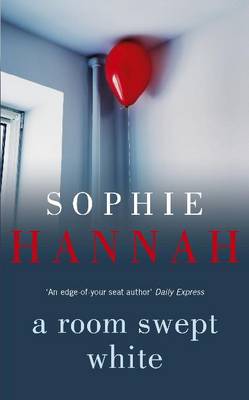
EURO CRIME
Reviews

Hannah, Sophie - 'A Room Swept White'
Hardback: 464 pages (Mar. 2010) Publisher: Hodder & Stoughton ISBN: 0340980621
In her new novel, Sophie Hannah addresses the complex and delicate issue of women who are accused, and sometimes convicted, of killing their own babies despite claiming that the deaths are natural. This subject is a very upsetting one, yet the author handles it with care and insight, weaving many perspectives into a vivid tapestry.
The plot that provides the framework for various such cases is a media company where "Fliss" (Felicity) Benson is a junior TV producer of domestic documentaries. When we see events from her perspective, she's an irritating person, in love "from afar" with her distant, awful boss Laurie Nattrass, who is not only an award-winning programme maker but has formed an organisation JIPAC (justice for innocent parents and carers) to represent falsely accused women as a result of an obsession he has developed about an expert medical witness for the prosecution, Judith Duffy. As part of his campaign, he is making a TV programme about miscarriages of justice, which cannot be broadcast for legal reasons until Duffy has been struck off by the GMC (General Medical Council), for the whole point of the programme is to show that Duffy's evidence has unfairly led to convictions in a whole series of cases. One day, Laurie unexpectedly calls Fliss into his office and tells her that he's resigning to take up a better job elsewhere, and has put her in charge of the film. It rapidly transpires that he has to do this because it is the company, not him personally, who has the contract for the programme, and he intends that Fliss will act as a figurehead, but that he will be directing her behind the scenes.
Once she has worked out what is going on, the lovestruck Fliss does at least, to her credit, find this plan insulting, and decides to pursue the investigative aspects on her own, as she is curious about various avenues Laurie has left untouched in his determination to make Duffy the villain. As well as Duffy herself, Fliss meets several of the mothers, hearing their stories as well as those of their partners, neighbours, enemies and friends. Part of the book is told as excerpts from newspaper articles about the cases, and as extracts from a book written by one of the women upon her release from prison, about her ordeal. These parts of the novel, which taken together present a rounded perspective of the problems of protecting children; the reliability of evidence for whether their deaths were natural or "forensic"; and the effects on the mothers and their families are powerful and strong, having great impact and with some good characterisation of the accused women in the chosen cases.
As well as Fliss's story, the police feature in this novel in the shape of regular series characters "Snowman" Proust, the eccentric couple Charlie and Simon, and their colleagues at Spilling police station whom we've met previously. This novel, however, can be read without knowing about these characters' previous adventures, as they are somewhat incidental to the main part of the book.
Although I enjoyed this novel, I feel that some parts of it were unnecessarily convoluted for no very good reason, depending too much on devices such as the unreliable narrator - when the narrator hints at knowledge she has but is not shared with the reader, for example. I also felt that the basic plot 'hook' in which various people are given or sent cards with numbers written on them, was not convincing, and the resolution to this thriller aspect of the book was frankly daft - that is, the murders, who committed them and why, and the subplot about a favourite poem. In addition, various aspects of the set-up are simply left in the air. I was annoyed, to put it mildly, that the author gives apparent credence to a comprehensively discredited theory about vaccines being unsafe. I don't mean to be down on the book, though, as there were many parts of it I enjoyed. I even came round to Fliss as she matured from a daffy dimwit into a capable woman. I am very glad I read this novel, if only for the insight that it provides about the difficulties of the awful, but real, problem of apparent accidental deaths of babies that is all too rarely discussed in a rational way by the media or the rest of our society.
Maxine Clarke, England
March 2010
Details of the author's other books with links to reviews can be found on the Books page.
More European crime fiction reviews can be found on the Reviews page.